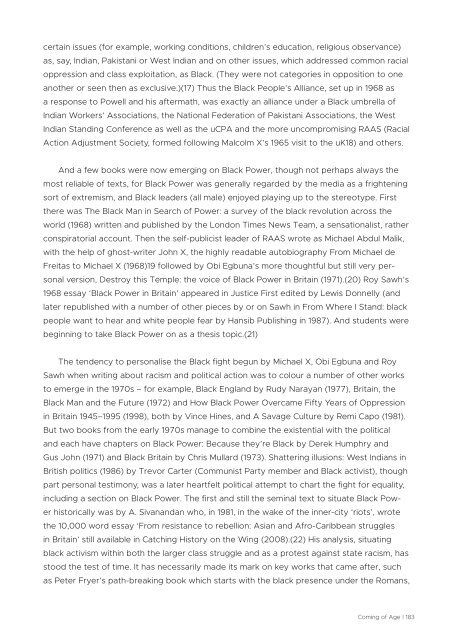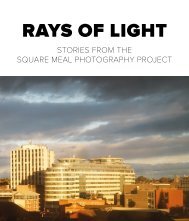Coming of Age : 1976 and the Road to Anti-Racism
Coming of Age : 1976 and the Road to Anti-Racism by Jagdish Patel and Suresh Grover
Coming of Age : 1976 and the Road to Anti-Racism
by Jagdish Patel and Suresh Grover
Create successful ePaper yourself
Turn your PDF publications into a flip-book with our unique Google optimized e-Paper software.
certain issues (for example, working conditions, children’s education, religious observance)<br />
as, say, Indian, Pakistani or West Indian <strong>and</strong> on o<strong>the</strong>r issues, which addressed common racial<br />
oppression <strong>and</strong> class exploitation, as Black. (They were not categories in opposition <strong>to</strong> one<br />
ano<strong>the</strong>r or seen <strong>the</strong>n as exclusive.)(17) Thus <strong>the</strong> Black People’s Alliance, set up in 1968 as<br />
a response <strong>to</strong> Powell <strong>and</strong> his aftermath, was exactly an alliance under a Black umbrella <strong>of</strong><br />
Indian Workers’ Associations, <strong>the</strong> National Federation <strong>of</strong> Pakistani Associations, <strong>the</strong> West<br />
Indian St<strong>and</strong>ing Conference as well as <strong>the</strong> uCPA <strong>and</strong> <strong>the</strong> more uncompromising RAAS (Racial<br />
Action Adjustment Society, formed following Malcolm X’s 1965 visit <strong>to</strong> <strong>the</strong> uK18) <strong>and</strong> o<strong>the</strong>rs.<br />
And a few books were now emerging on Black Power, though not perhaps always <strong>the</strong><br />
most reliable <strong>of</strong> texts, for Black Power was generally regarded by <strong>the</strong> media as a frightening<br />
sort <strong>of</strong> extremism, <strong>and</strong> Black leaders (all male) enjoyed playing up <strong>to</strong> <strong>the</strong> stereotype. First<br />
<strong>the</strong>re was The Black Man in Search <strong>of</strong> Power: a survey <strong>of</strong> <strong>the</strong> black revolution across <strong>the</strong><br />
world (1968) written <strong>and</strong> published by <strong>the</strong> London Times News Team, a sensationalist, ra<strong>the</strong>r<br />
conspira<strong>to</strong>rial account. Then <strong>the</strong> self-publicist leader <strong>of</strong> RAAS wrote as Michael Abdul Malik,<br />
with <strong>the</strong> help <strong>of</strong> ghost-writer John X, <strong>the</strong> highly readable au<strong>to</strong>biography From Michael de<br />
Freitas <strong>to</strong> Michael X (1968)19 followed by Obi Egbuna’s more thoughtful but still very personal<br />
version, Destroy this Temple: <strong>the</strong> voice <strong>of</strong> Black Power in Britain (1971).(20) Roy Sawh’s<br />
1968 essay ‘Black Power in Britain’ appeared in Justice First edited by Lewis Donnelly (<strong>and</strong><br />
later republished with a number <strong>of</strong> o<strong>the</strong>r pieces by or on Sawh in From Where I St<strong>and</strong>: black<br />
people want <strong>to</strong> hear <strong>and</strong> white people fear by Hansib Publishing in 1987). And students were<br />
beginning <strong>to</strong> take Black Power on as a <strong>the</strong>sis <strong>to</strong>pic.(21)<br />
The tendency <strong>to</strong> personalise <strong>the</strong> Black fight begun by Michael X, Obi Egbuna <strong>and</strong> Roy<br />
Sawh when writing about racism <strong>and</strong> political action was <strong>to</strong> colour a number <strong>of</strong> o<strong>the</strong>r works<br />
<strong>to</strong> emerge in <strong>the</strong> 1970s – for example, Black Engl<strong>and</strong> by Rudy Narayan (1977), Britain, <strong>the</strong><br />
Black Man <strong>and</strong> <strong>the</strong> Future (1972) <strong>and</strong> How Black Power Overcame Fifty Years <strong>of</strong> Oppression<br />
in Britain 1945–1995 (1998), both by Vince Hines, <strong>and</strong> A Savage Culture by Remi Capo (1981).<br />
But two books from <strong>the</strong> early 1970s manage <strong>to</strong> combine <strong>the</strong> existential with <strong>the</strong> political<br />
<strong>and</strong> each have chapters on Black Power: Because <strong>the</strong>y’re Black by Derek Humphry <strong>and</strong><br />
Gus John (1971) <strong>and</strong> Black Britain by Chris Mullard (1973). Shattering illusions: West Indians in<br />
British politics (1986) by Trevor Carter (Communist Party member <strong>and</strong> Black activist), though<br />
part personal testimony, was a later heartfelt political attempt <strong>to</strong> chart <strong>the</strong> fight for equality,<br />
including a section on Black Power. The first <strong>and</strong> still <strong>the</strong> seminal text <strong>to</strong> situate Black Power<br />
his<strong>to</strong>rically was by A. Sivan<strong>and</strong>an who, in 1981, in <strong>the</strong> wake <strong>of</strong> <strong>the</strong> inner-city ‘riots’, wrote<br />
<strong>the</strong> 10,000 word essay ‘From resistance <strong>to</strong> rebellion: Asian <strong>and</strong> Afro-Caribbean struggles<br />
in Britain’ still available in Catching His<strong>to</strong>ry on <strong>the</strong> Wing (2008).(22) His analysis, situating<br />
black activism within both <strong>the</strong> larger class struggle <strong>and</strong> as a protest against state racism, has<br />
s<strong>to</strong>od <strong>the</strong> test <strong>of</strong> time. It has necessarily made its mark on key works that came after, such<br />
as Peter Fryer’s path-breaking book which starts with <strong>the</strong> black presence under <strong>the</strong> Romans,<br />
<strong>Coming</strong> <strong>of</strong> <strong>Age</strong> | 183<br />
<strong>Coming</strong> <strong>of</strong> <strong>Age</strong> Final version 16.10.indd 183 17/10/2017 12:08







